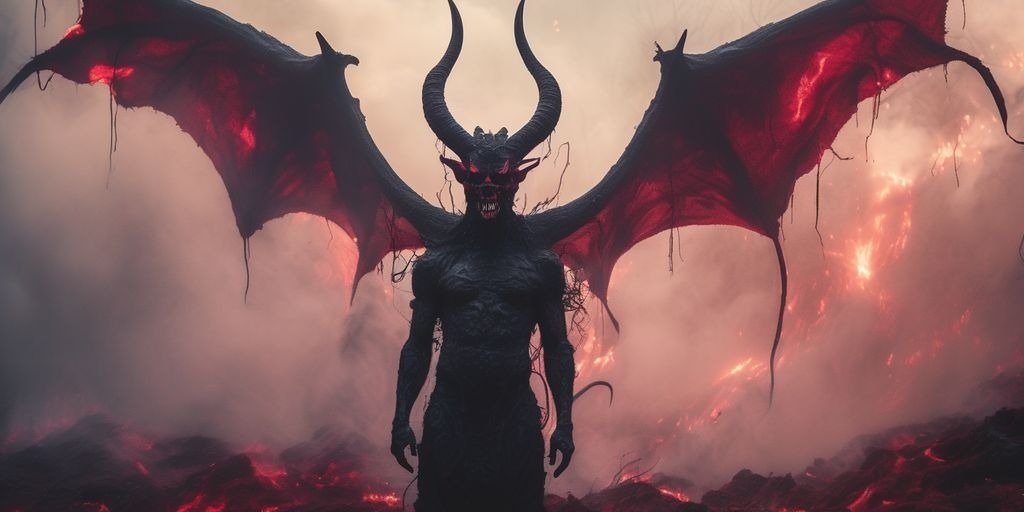Dreaming of demons can be a deeply unsettling experience, often leaving individuals with lingering feelings of fear and confusion. These dreams can carry a multitude of meanings, from psychological interpretations to cultural and spiritual perspectives. Understanding what it means to dream of demons requires a comprehensive exploration of various themes, impacts, and implications associated with such dreams.
Key Takeaways
- Dreams about demons often symbolize inner turmoil, guilt, and unresolved emotions.
- Cultural and historical contexts play a significant role in how demonic dreams are interpreted.
- Such dreams can have a profound psychological impact, potentially leading to anxiety and sleep disorders.
- Spiritual and religious perspectives offer different interpretations and coping mechanisms for demonic dreams.
- Effective management of demonic dreams involves good sleep hygiene, therapeutic approaches, and mindfulness practices.
Understanding the Symbolism of Demons in Dreams
Dreams about demons can be unsettling, but they often carry deep symbolic meanings. Demons in dreams frequently represent internal struggles or negative emotions that one might be grappling with in waking life. These dreams can serve as a mirror to our subconscious, reflecting feelings of guilt, aggression, or even a desire for love.
Historical Context of Demonic Symbols
Throughout history, demons have been depicted in various ways across different cultures. In ancient civilizations, demons were often seen as malevolent spirits or deities that could influence human behavior. These historical interpretations can provide insight into why demons appear in our dreams today.
Psychological Interpretations
From a psychological perspective, dreaming about demons usually refers to feelings you are denying, but that have, nevertheless, taken hold of you. These dreams can be a manifestation of inner turmoil, unresolved conflicts, or suppressed emotions. Depth psychology suggests that such dreams might be a hidden warning from your unconscious mind.
Cultural Variations
The symbolism of demons in dreams can vary widely across cultures. In some cultures, demons are seen as protectors or guides, while in others, they are viewed as harbingers of doom. Understanding these cultural variations can help in interpreting the specific meaning of demonic dreams for an individual.
Common Themes in Demonic Dreams
Recurring Motifs
Demonic dreams often feature recurring motifs that can be unsettling. These motifs may include being chased, attacked, or possessed by demons. Such dreams can be a reflection of inner conflicts and unresolved issues. Analyzing these dreams can reveal hidden fears and emotional burdens.
Emotional Triggers
Emotional triggers play a significant role in demonic dreams. Feelings of fear, anxiety, and stress are common precursors to such dreams. These emotions can stem from various sources, including personal relationships, work pressures, and past traumas.
Symbolic Meanings
The symbolic meanings of demonic dreams can vary widely. In some cases, demons may represent immoral or difficult people in one’s life. In other instances, they may symbolize internal struggles or negative aspects of one’s personality. Understanding the symbolism can provide valuable insights into one’s subconscious mind.
Demonic dreams often symbolize inner conflicts and unresolved issues. Analyzing these dreams can reveal hidden fears and emotional burdens.
Psychological Impact of Demonic Dreams
Anxiety and Fear
Demonic dreams often evoke intense anxiety and fear. These emotions can linger long after waking, affecting daily life and mental well-being. The fear experienced in such dreams can be a manifestation of subconscious fears, anxieties, or traumas.
Long-term Effects
The long-term effects of recurring demonic dreams can be profound. Individuals may develop chronic stress or anxiety disorders. In some cases, these dreams can lead to sleep disturbances, impacting overall health.
Coping Mechanisms
To manage the psychological impact of demonic dreams, several coping mechanisms can be employed:
- Therapy: Seeking professional help can provide strategies to deal with the underlying issues causing these dreams.
- Mindfulness and Meditation: Practicing mindfulness can help in reducing the anxiety associated with these dreams.
- Journaling: Writing down dreams can sometimes lessen their emotional impact.
Understanding the psychological impact of demonic dreams is crucial for mental health and well-being.
Demonic Dreams and Personal Relationships
Projection of Inner Turmoil
Demonic dreams often serve as a projection of inner turmoil. These dreams can be a manifestation of unresolved conflicts or emotional distress. For instance, seeing yourself communicating with a demon might indicate that you are being deceived or manipulated by someone in your social circle. This could be your unconscious mind sending you a hidden warning about the people around you.
Impact on Interpersonal Dynamics
The presence of demons in dreams can significantly impact your interpersonal dynamics. If you find yourself being chased or intimidated by demons, it could mean that you are experiencing emotional and psychological issues in your romantic relationships. These dreams might reflect self-doubt and multiplying issues with your spouse or partner, leading to destructive dream patterns.
Healing and Reconciliation
Addressing the root causes of demonic dreams can lead to healing and reconciliation in personal relationships. By understanding the underlying emotional triggers, you can work towards resolving conflicts and improving your relationships. Techniques such as mindfulness, therapy, and open communication can be effective in mitigating the negative impact of these dreams.
Demonic dreams can be confusing and misguided, but they often hold significant insights into your emotional and psychological state. Understanding these dreams can help you navigate complex situations and improve your personal relationships.
Health Implications of Demonic Dreams
Stress and Sleep Disorders
Demonic dreams can significantly disrupt sleep patterns, leading to chronic sleep disorders such as insomnia or sleep apnea. Persistent nightmares involving demonic figures can elevate stress levels, making it difficult for individuals to achieve restful sleep.
Physical Symptoms
The physical toll of demonic dreams can manifest in various ways, including headaches, fatigue, and muscle tension. These symptoms are often a result of the body’s prolonged stress response to the disturbing nature of the dreams.
Mental Health Considerations
Frequent demonic dreams can exacerbate underlying mental health issues such as anxiety and depression. It’s crucial to address these dreams through therapeutic interventions to prevent long-term psychological harm.
Addressing the root causes of demonic dreams can lead to improved overall health and well-being. Identifying stressors and emotional triggers is a vital step in managing these unsettling experiences.
Spiritual Perspectives on Demonic Dreams
Religious Interpretations
In many religious traditions, demonic dreams are seen as spiritual warfare. For instance, in Christianity, such dreams may be interpreted as a call to prayer and invoking the power of Jesus’ name. The Bible encourages facing daunting experiences head-on, suggesting that sleep paralysis and demonic dreams could be interpreted as spiritual battles.
Spiritual Cleansing
Spiritual cleansing practices are often recommended to combat demonic dreams. These may include rituals such as smudging with sage, reciting protective prayers, or using holy water. The goal is to purify the dreamer’s environment and spirit, creating a barrier against negative entities.
Rituals and Practices
Various cultures have specific rituals to ward off demonic influences in dreams. These can range from simple bedtime prayers to elaborate ceremonies involving multiple participants. Common practices include:
- Lighting candles or incense
- Placing protective amulets under the pillow
- Performing meditation or mindfulness exercises before sleep
When faced with daunting experiences, the Bible encourages prayer and invoking the power of Jesus’ name. Can sleep paralysis be interpreted as demonic in the Bible?
These spiritual perspectives offer a framework for understanding and addressing the unsettling experience of demonic dreams.
Analyzing Specific Demonic Dream Scenarios
Being Chased by a Demon
Being chased by a demon in a dream often symbolizes running away from something in your waking life. This could be an unresolved issue, a fear, or a person you are avoiding. The demon represents the negative energy or emotions that you are trying to escape from.
Feeding a Demon
Feeding a demon in your dream can indicate that you are nurturing negative thoughts or behaviors. It may also suggest that you are giving in to temptations or harmful habits. This scenario often calls for self-reflection to identify what negative aspects you are feeding in your life.
Fighting a Demon
Fighting a demon in a dream usually signifies an internal struggle. This could be a battle with your own fears, guilt, or other negative emotions. Overcoming the demon in the dream can be a powerful symbol of personal victory and growth.
Demonic dreams often serve as a mirror to our inner conflicts and unresolved issues. Understanding these scenarios can provide valuable insights into our subconscious mind.
Preventing and Managing Demonic Dreams
Sleep Hygiene
Maintaining good sleep hygiene is crucial in preventing demonic dreams. Staying healthy by eating well, maintaining a regular sleep schedule, and drinking enough water can significantly improve sleep quality. Additionally, creating a calming bedtime routine can help ease the mind before sleep.
Therapeutic Approaches
Therapy can be an effective way to manage and prevent demonic dreams. Cognitive-behavioral therapy (CBT) is particularly useful in addressing the underlying issues that may be causing these dreams. Therapists can help individuals develop coping strategies and techniques to reduce anxiety and fear associated with demonic dreams.
Mindfulness and Meditation
Practicing mindfulness and meditation can help in managing stress and anxiety, which are often triggers for demonic dreams. These practices can promote relaxation and mental clarity, making it easier to achieve a restful night’s sleep.
Tip: Incorporating mindfulness exercises into your daily routine can have long-term benefits for your mental health and sleep quality.
Case Studies and Personal Accounts
Real-life Experiences
In this section, we delve into real-life experiences of individuals who have encountered demonic dreams. These accounts provide a firsthand look at the emotional and psychological impact of such dreams. For instance, one individual described a recurring dream where they were being chased by a demon, leading to severe anxiety and disrupted sleep patterns.
Expert Analyses
Experts in psychology and dream analysis offer insights into the underlying causes and meanings of demonic dreams. They often highlight the role of stress, trauma, and unresolved inner conflicts as significant contributors. According to one expert, “When a demon attacks you in your dream state, it is often a manifestation of deep-seated fears and anxieties.”
Lessons Learned
From these case studies and expert analyses, several key lessons emerge:
- Understanding Triggers: Identifying and addressing the emotional triggers that lead to demonic dreams can significantly reduce their frequency.
- Therapeutic Approaches: Engaging in therapy or counseling can help individuals process underlying issues and alleviate the psychological burden of these dreams.
- Coping Mechanisms: Developing healthy coping mechanisms, such as mindfulness and relaxation techniques, can mitigate the impact of demonic dreams on daily life.
Not surprisingly, therefore we meet and work with other people and we often find we have a different perspective on things. Our backgrounds and life experiences lead us to see things in different ways. We each have our own unique history and characteristics.
The Role of Demons in Nightmares
Nightmares involving demons are a common phenomenon that can be deeply unsettling. These dreams often reflect our deepest fears and anxieties, manifesting in the form of demonic entities. Understanding the role of demons in nightmares can help individuals address underlying psychological issues.
Demonic Dreams in Popular Culture
Movies and TV Shows
Demonic dreams have been a recurring theme in movies and TV shows, often used to evoke fear and suspense. Films like “The Exorcist” and TV series such as “Supernatural” explore the terrifying aspects of demonic encounters in dreams. These portrayals can shape public perception and even influence the way people interpret their own dreams.
Literature and Art
In literature and art, demons in dreams have been depicted in various ways, from the grotesque to the symbolic. Classic works like Dante’s “Inferno” and modern novels such as “Dreams in the Dark: The Eerie Origins of ‘Nightmare’” delve into the symbolism of demonic figures. Artists often use demonic imagery to represent inner turmoil and existential dread.
Influence on Public Perception
The portrayal of demonic dreams in popular culture significantly impacts public perception. In various cultures, nightmares have been attributed to spiritual or demonic forces. This cultural backdrop can lead individuals to view their own demonic dreams through a lens of fear and superstition. The media’s depiction of these dreams often reinforces these beliefs, making it crucial to approach such portrayals with a critical mind.
The influence of popular culture on our understanding of demonic dreams cannot be overstated. It shapes not only our fears but also our interpretations of these unsettling experiences.
Conclusion
Dreaming of demons can be a deeply unsettling experience, often reflecting our innermost fears, guilt, and unresolved emotions. These dreams may serve as a hidden warning from our subconscious, urging us to confront the darker aspects of our personality or the negative influences around us. While the presence of demons in dreams can symbolize a range of issues from personal struggles to external threats, understanding the context and details of the dream is crucial for accurate interpretation. By acknowledging and addressing these underlying issues, we can transform these nightmarish visions into opportunities for personal growth and emotional healing.
Frequently Asked Questions
What does it mean to dream of demons?
Dreaming of demons can symbolize various aspects such as inner turmoil, guilt, aggression, or even a hidden warning from your unconscious mind. It often reflects negative emotions or situations in your waking life.
Are demonic dreams a sign of mental health issues?
While demonic dreams can be unsettling, they are not necessarily a sign of mental health issues. However, frequent and disturbing dreams may indicate underlying stress, anxiety, or other psychological concerns that might benefit from professional consultation.
Can demonic dreams predict future events?
There is no scientific evidence to support the idea that dreams, including demonic ones, can predict future events. They are more likely to be a reflection of your current emotional state or subconscious mind.
Why do I keep having recurring dreams about demons?
Recurring demonic dreams might indicate unresolved issues or persistent stress in your life. It could be your mind’s way of urging you to address these problems.




